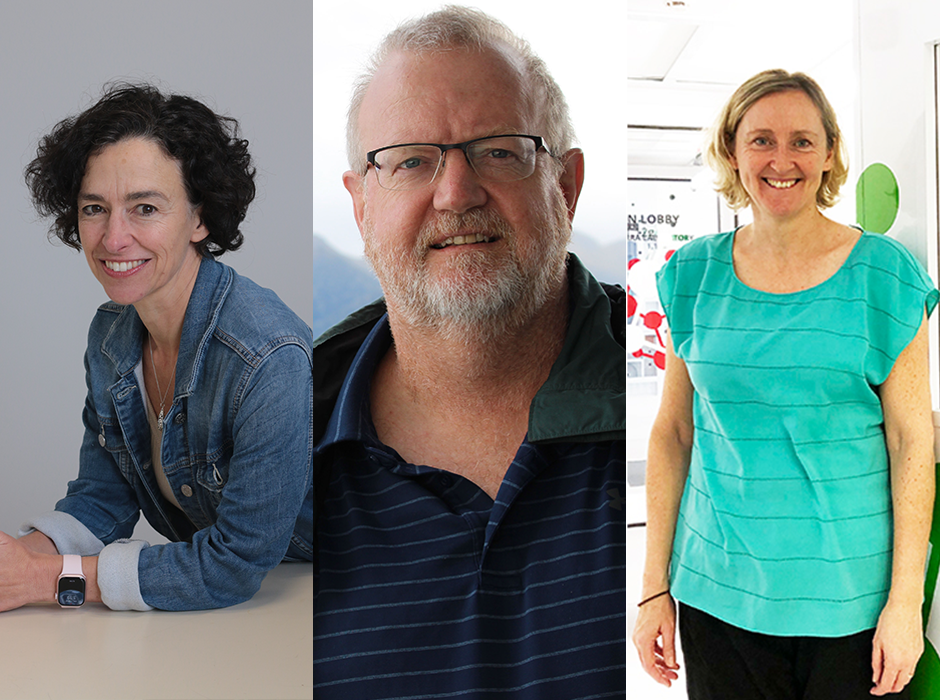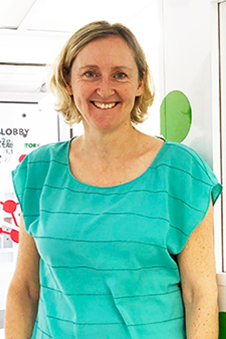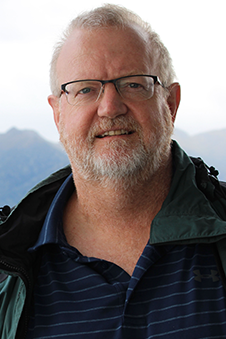
The Royal Society Te Apārangi Fellows. From left, Professor Michelle Glass, Professor David Grattan, Professor Claudine Stirling.
University of Otago academics awarded Fellowships from the Royal Society Te Apārangi have been focusing on hidden worlds both in and around us.
From how the pituitary gland hormone prolactin acts in the brain to promote parental interactions with offspring, through to examining small variations in the isotopic signatures of trace metals, the three academics awarded Fellowships have been uncovering more than just what meets the eye.
Professors David Grattan, Claudine Stirling and Michelle Glass are this year’s recipients and will officially receive the honour at a ceremony in Wellington on Thursday, 18 April.
The Fellowships are awarded to academics who have made a significant contribution to an area of expertise and are working to increase Aotearoa’s knowledge base.

Professor Michelle Glass
Professor Michelle Glass, Division of Health Sciences, School of Biomedical Sciences, Department of Pharmacology and Toxicology
Michelle is a leading pharmacologist, globally renowned for her work on cannabinoid receptors. Her research has led to new understanding of the role of these receptors in normal human brains and in disease states. Her work has enhanced our understanding of novel drugs and compounds targeted to cannabinoid receptors and to understanding the harm caused by synthetic cannabinoids.
A role model and mentor for a generation of young scientists, Michelle has not only undertaken revolutionary basic biomedical research, but has also informed and influenced drug policy and education both locally and internationally and was a critical contributor to New Zealand’s debate on medicinal and recreational cannabis.
All this has been achieved while taking on substantive teaching and leadership roles, including over a decade in Head of Department roles at the University of Auckland and at the University of Otago.

Professor Claudine Stirling
Professor Claudine Stirling, Division of Sciences, Department of Geology
Claudine receives her Fellowship for the development and application of novel analytical techniques in trace element isotope geochemistry.
As a Professor of Geochemistry and the Director of the ‘Centre for Trace Element Analysis’, her research examines small variations in the isotopic signatures of trace metals. Using this information, she can understand the biogeochemical processes at work on Earth both today and in the past.
Claudine has revised the chronology of the early solar system, constrained the rise and fall of oxygen in Earth’s past oceans and calibrated the geochemical proxies used to derive these records, evaluated sea-level and climate change on recent ‘glacial-interglacial’ timescales, and examined the role of trace metal ‘micronutrients’ in the oceans for sequestering atmospheric CO2.
She has an extensive background in technique-driven research to investigate new, previously unexplored applications, with her discovery of uranium isotope variations in nature now being widely applied across the geochemical sciences.
Together with the Centre’s technical team, her students and postdoctoral fellows, and other Otago staff, she has significantly enhanced research capability at the University of Otago, fostering collaborative and commercial relationships both within and outside of the earth sciences.
Claudine’s research efforts and career have changed the geochemistry and isotope geochemistry landscapes in New Zealand.

Professor David Grattan
Professor David Grattan, Division of Health Sciences, School of Biomedical Sciences, Department of Anatomy
David is a world leader in investigating central nervous system actions of the anterior pituitary hormone prolactin, receiving his Fellowship for research into hormone-induced adaptations in the maternal brain during pregnancy.
David started his career investigating prolactin, which is known for its key role in stimulating milk production during lactation.
His group discovered that receptors for prolactin were actually widespread in the brain in both males and females, suggesting that this hormone must have some other functions, beyond simply that of lactation.
Using parental behaviour as an example, prolactin action in the brain is important in both males and females to promote a parent’s interactions with offspring, leading David’s group to go on to characterise a diverse range of brain functions that are regulated by prolactin.
These include suppression of fertility, adaptive changes in metabolism, thermoregulation and physical activity in pregnancy.
The range of the different functions identified for this single hormone has been conceptually difficult to understand. David has been promoting the idea that high levels of prolactin present during pregnancy coordinates a broad range of adaptive changes in maternal physiology and behaviour that must happen to help females cope with the demands of pregnancy.
~ Kōrero by the Division of Health Sciences Communications Adviser, Kelsey Swart.